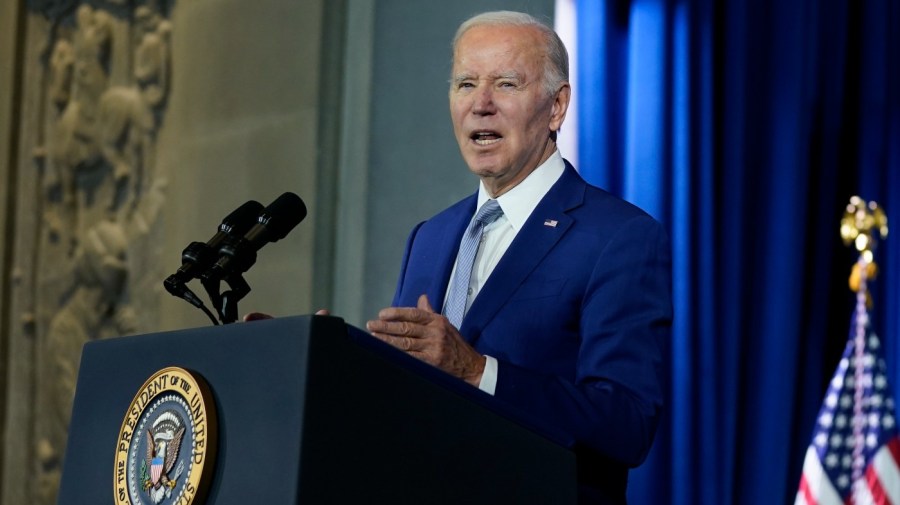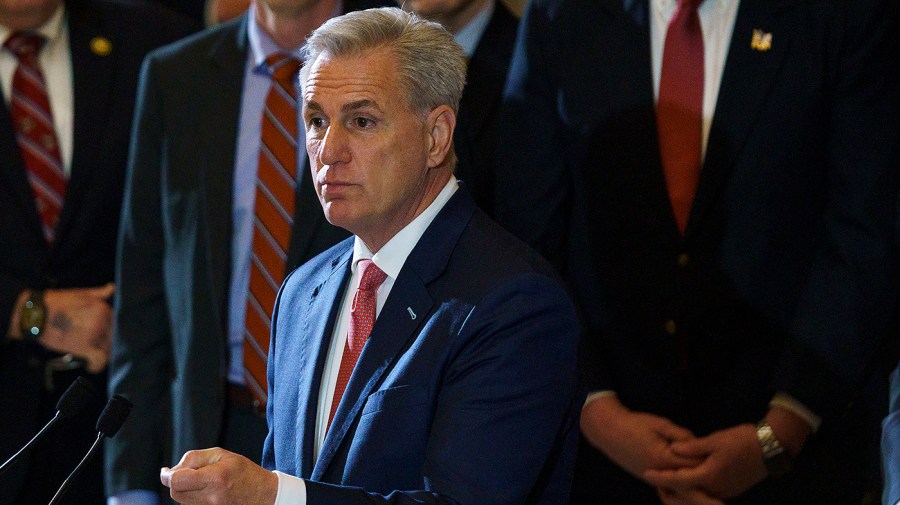White House steps up attacks on GOP budget

The White House this week is stepping up attacks on conservative Republicans, using a budget proposal by a bloc of lawmakers to hit the opposition party on key issues that typically rile the base ahead of 2024.
The Biden administration kicked off a messaging campaign to slam the House Freedom Caucus’s budget proposal on a daily basis and also go after other conservative groups — like the Republican Study Committee — that have in recent weeks criticized Biden’s budget proposal, which was made public earlier this month.
The House Republican-White House tit-for-tat over issues like Social Security and Medicare has dominated fiscal talks for much of the year, but the White House is now drawing on what it calls “draconian cuts” on a host of other things central to the GOP: Manufacturing jobs, public safety and border security.
It began when the White House declared a “five-alarm fire” to describe the Freedom Caucus’s proposal, arguing it would be “a disaster for families in at least five key ways,” comprising what the White House claimed to be endangering public safety, raising costs for families, shipping manufacturing jobs overseas and undermining American workers, weakening national security and hurting seniors.

President Biden and Democrats are framing the Freedom Caucus’s budget as a disaster for families in five ways or a “five alarm fire.” (AP Photo/Evan Vucci)
“Democrats are going to explain what budget cuts mean to everyday Americans and that’s been the heart of Democratic messaging against austerity budgeting for years,” said Charlie Ellsworth, partner at Pioneer Public Affairs and former budget aide for Senate Majority Leader Chuck Schumer (D-N.Y.).
Indeed, the strategy gives the Biden administration a head start to crafting such messaging ahead of when the president plans to run for reelection in 2024.
“The White House’s budget strategy is clear. They’re elevating unpopular proposals from the Freedom Caucus because that contrast benefits the president,” said Nu Wexler, a partner at Seven Letter and former communications director for the House Budget Committee Democrats.
The Freedom Caucus is pushing to restrict discretionary funding for fiscal 2024 at the 2022 threshold, while keeping defense funding at current levels, in order to balance the federal budget in 10 years — the latter of which is a key goal of theirs.
The White House has argued the Republicans budget math “doesn’t add up,” highlighting in a statement Tuesday that a Congressional Budget Office estimate found that to reach the goal of balancing the budget in 10 years, “without raising taxes on the wealthy or corporations, and without cutting Social Security, Medicare, defense and some veteran’s benefits-Congressional Republicans would need to eliminate everything else in the Federal budget.”
The “five-alarm fire” messaging strategy is also in coordination with the House Appropriations Committee ranking member Rosa DeLauro (Conn.) and other House Democrats, who are highlighting this week that government agencies are sounding the alarm over the impacts of returning to 2022 spending levels.
The White House’s “five-alarm fire” messaging has highlighted the potential impact of the Freedom Caucus’s budget on costs for Americans — an offensive tactic as the administration has spent the better part of year struggling with amid stubborn inflation.
The messaging also turned toward hammering the Freedom Caucus on matters central to the conservative Republican base, such as endangering public safety, and a back-and-forth over how Republicans and Democrats are approaching border security.

Rep. Rosa DeLauro (Greg Nash)
The Freedom Caucus says the Biden administration’s budget would make the border less secure, but the president’s budget in fact includes funding to hire more agents to staff the southern border.
The tactic widely broadens the number of issues Biden and House Republicans have been hammering each other on for much of the year, which has centered heavily so far on Social Security and Medicare.
Biden has insisted that Republicans want to “cut” the programs based on some GOP suggestions that spending on the programs should be evaluated — a narrative backed up by a plan floated by Sen. Rick Scott (R-Fla.), who has suggested those programs “sunset” every five years. Scott’s plan, however, had no backing from Republican leadership on Capitol Hill.
Speaker Kevin McCarthy (R-Calif.), meanwhile, has said that any cuts to Social Security and Medicare as part of a deal would be “off the table.”
But that didn’t stop the White House on Monday from highlighting a Social Security “solvency” plan from the Republican Study Committee, which proposed that if the Social Security Administration isn’t able to pay its debts, there will be automatic cuts to benefits.

Speaker Kevin McCarthy said that any cuts to Social Security and Medicare are off the table. (Greg Nash)
White House spokesperson Andrew Bates said in a statement that while Republican lawmakers fought back on the idea that they want to cut entitlement benefits when Biden brought it up in the State of the Union address, “Here we are months later, and the only budget we know the public will even get to see will do exactly that: cut Social Security benefits.”
Some argue that the president should invite McCarthy back to the White House to negotiate, regardless of the lack of consensus on a Republican budget to at least help the appearance of bipartisanship.
“I don’t think the president stiff-arming Republicans until they present a plan on paper is going to play very well,” said Stephen Cote, a principal at Mehlman Consulting and former director for legislative affairs at the Office of Management and Budget under former President George W. Bush.
Democrats, though, agree with the president’s tactic to call out Republicans for not presenting an alternate budget.
“I don’t see anything to engage with until McCarthy has a plan that’s supported by his caucus, otherwise, what is he coming to the table with? He has to show that he has the votes to pass something,” Ellsworth said. “The president, Democrats can’t solve that problem for him. He has to do that.”
Wexler also noted that McCarthy is in a tight spot with his caucus following the Speakership vote.
“There may be a loose Republican strategy to let the Freedom Caucus stake out a conservative position and let leadership negotiate from there,” he said. “But it’s more likely that McCarthy doesn’t want to disrupt his fragile coalition because he owes his Speakership to them.”
Copyright 2023 Nexstar Media Inc. All rights reserved. This material may not be published, broadcast, rewritten, or redistributed.

